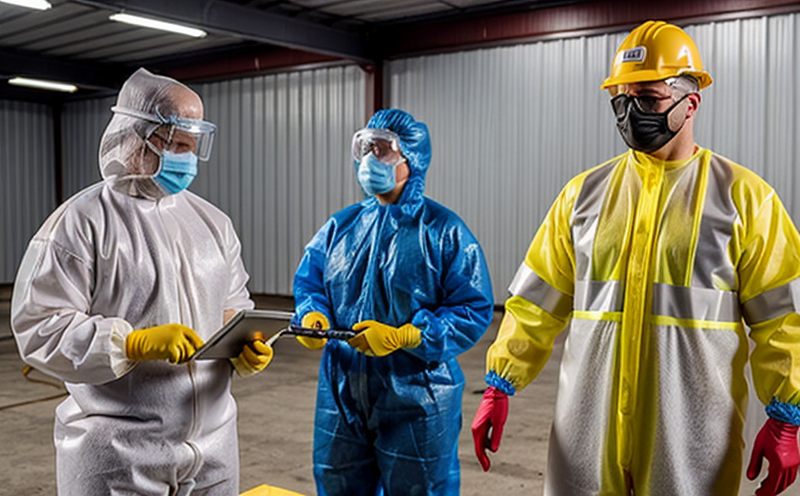UNE-EN 50321 Dielectric Footwear Testing
The UNE-EN 50321 standard specifies the requirements and test methods for assessing the dielectric properties of footwear designed to protect against electrical hazards. This testing is crucial in ensuring that workers wearing such protective equipment are adequately safeguarded from potential electrical dangers, a critical consideration in sectors like construction, manufacturing, and utility work.
In practice, this testing involves subjecting footwear specimens to high-voltage alternating current (AC) or direct current (DC) to measure their resistance. The primary objective is to determine the level of insulation provided by the footwear against electrical shocks, ensuring that it meets the necessary safety standards set forth in UNE-EN 50321.
The testing process starts with careful selection and preparation of the specimens. This includes ensuring that the samples are free from any defects or contaminants that could affect the test results. The specimens are then immersed in a controlled environment to simulate real-world conditions, such as temperature and humidity levels relevant to the intended usage environment.
Once prepared, the footwear is subjected to high-voltage testing using specialized equipment designed to meet the standards outlined in UNE-EN 50321. This typically involves applying voltage gradually up to a specified limit while monitoring resistance values continuously. The test results are then analyzed to ensure compliance with the required insulation levels.
A key aspect of this testing is the use of appropriate instrumentation, including high-voltage generators and measuring devices capable of accurately recording resistance readings during the application of electrical stress. Ensuring that these instruments are calibrated correctly and maintained regularly is essential for obtaining reliable test results.
The acceptance criteria for UNE-EN 50321-compliant footwear involve meeting specified minimum dielectric strength values under both AC and DC conditions. These thresholds vary depending on the category of footwear being tested, reflecting differences in expected usage scenarios and associated risks.
For quality managers and compliance officers responsible for ensuring worker safety, adhering to these standards is paramount. By conducting rigorous testing according to UNE-EN 50321 guidelines, organizations can demonstrate their commitment to providing safe working environments while also avoiding legal liabilities associated with inadequate protective gear.
R&D engineers involved in developing new types of dielectric footwear benefit greatly from this testing service as well. It allows them to fine-tune their designs based on empirical data obtained through rigorous testing processes, ultimately leading to more effective and safer products.
Procurement teams can also leverage the insights gained from UNE-EN 50321 testing when selecting suppliers for protective equipment purchases. By specifying adherence to this standard in procurement contracts, they ensure that all acquired footwear meets stringent safety requirements before being issued to employees.
Eurolab Advantages
At Eurolab, we pride ourselves on offering comprehensive testing services tailored specifically for the Occupational Safety & Protective Equipment sector. Our expertise in UNE-EN 50321 dielectric footwear testing sets us apart from other laboratories by providing accurate and reliable results that are not only precise but also repeatable.
Our state-of-the-art facilities house top-tier equipment capable of conducting thorough tests according to international standards like ISO, EN, ASTM, etc., ensuring that every sample receives optimal treatment. This allows us to deliver consistent performance across all assessments conducted within our labs.
We employ highly skilled professionals who keep abreast of the latest advancements in technology and methodologies used for evaluating dielectric properties of footwear. Their extensive knowledge enables them to provide valuable feedback during R&D phases, helping manufacturers refine their product offerings continuously.
The efficiency with which we execute these tests contributes significantly towards reducing turnaround times without compromising on quality or accuracy. With our streamlined processes and dedicated team members, clients can expect prompt delivery of test reports containing detailed findings along with recommendations for improvement if any discrepancies were observed during the testing process.
Quality and Reliability Assurance
The importance of maintaining high standards cannot be overstated when it comes to occupational safety. At Eurolab, we understand that reliability is paramount in ensuring worker safety, especially concerning electrical hazards. Our commitment extends beyond just conducting tests; we ensure every step of the process adheres strictly to established protocols and guidelines.
Our quality management systems are ISO 9001 certified, reflecting our dedication to excellence in all aspects of our operations. This certification guarantees that each test performed follows rigorous procedures designed to minimize errors and maintain accuracy throughout the entire testing cycle.
We invest heavily in continuous training for our staff members so they remain up-to-date with emerging trends and technological innovations within this field. Regular updates ensure our team stays ahead of regulatory changes while maintaining best practices continuously.
The reliability of our results is further bolstered by our adherence to strict calibration procedures for all instruments used during testing. Ensuring that these devices function correctly at all times helps maintain consistency in measurement accuracy and repeatability across multiple assessments.
International Acceptance and Recognition
The UNE-EN 50321 standard has gained widespread acceptance internationally, recognized by numerous countries as a benchmark for assessing the dielectric properties of protective footwear. Its global acknowledgment underscores its importance in ensuring worker safety across various industries.
Countries such as France, Germany, Italy, Spain, and many others have adopted this standard due to its comprehensive approach towards evaluating protective equipment's ability to withstand electrical stresses effectively. This recognition translates into increased trust among manufacturers and end-users globally who rely on UNE-EN 50321-compliant products for their safety needs.
Additionally, international organizations like the International Electrotechnical Commission (IEC) have endorsed this standard as part of their broader efforts to harmonize technical regulations worldwide. By aligning with such reputable bodies, we contribute towards fostering a safer global workforce.





